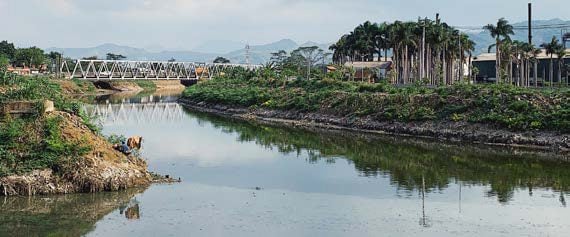Revitalizing the Citarum River through Community Empowerment

-
Date:
24 Apr 2021 -
Author:
KEHATI
As a source of water for industry and society in the cities of Bandung, Purwakarta, Jakarta, Karawang and Bekasi, the function of the Citarum River is very important for life. However, concern for cleanliness seems neglected.
This can be seen from the status of heavy pollution caused by industrial waste, domestic waste, and agricultural waste. As a result, in 2018 by the World Bank, the Citarum River was named the dirtiest river in the world. The KEHATI Foundation and partners see a different approach from that of the Citarum Harum Task Force.
Actually the Citarum River revitalization program has been carried out by the West Java Provincial Government and several other stakeholders, one of which is the formation of the Citarum Harum Program in 2018.
To support this program, PT Bank HSBC Indonesia (HSBC), the KEHATI Foundation, and GIF (Green Initiative Foundation) initiated a project entitled Revitalization and Rehabilitation of the Citarum River as a Source of Sustainable Life (Revive Citarum) for the 2019-2020 period.
Activities carried out in the Citarum River revitalization program include mentoring industries and communities around the central part of the Citarum River with the target beneficiary of 250 industries and 470 thousand local people.
The intervention area covers 22 km2 along the central Citarum river flow. Revive Citarum activities are carried out in partnership with the Green Initiative Foundation and the Citarum Harum Task Force at the local level.
In the January-March 2020 period, there were a number of meetings and outreach to the community regarding efforts to sort and reduce the waste generated by households in seven RW (Rukun Warga) in Bojongsari Village, Bandung.
The waste sorting program involves 87 heads of families (KK) who actively sort and manage 6 waste. In addition, 150 biopore holes have also been made to assist the composting process of organic waste.
“From several strategies implemented, household waste management is a significant solution to reduce pollution levels of the Citarum River. Therefore, we continue to encourage community empowerment programs living around the river, “said KEHATI Foundation Forestry Ecosystem Manager Imanuddin Utoro in a press release, Tuesday, February 23, 2021.
He said, the use of organic waste as food for Black Soldier Fly maggots was also carried out to increase people’s income. At this time, he continued, the installation of the Black Soldier Fly (BSF) maggot house had been built in RW 12, Bojongsari village to manage the organic waste generated by the community.
“The cage built is 3×5 meters in size, contains 100 maggot reactors, which are capable of managing 3 tons of organic fertilizer per month. The resulting maggot can then be sold as fish feed. However, currently the maggot cage has not yet reached the stage of producing enough maggot to be sold. still at the stage of destroying household organic waste, “he explained.
Apart from using the BSF maggot, waste management is also carried out by the composting method. Currently, as many as 90 composter vats with a capacity of 200 liters each have been made which are distributed to the community in Bojongsari village.
This article has been published on galamedia.pikiran-rakyat.com
